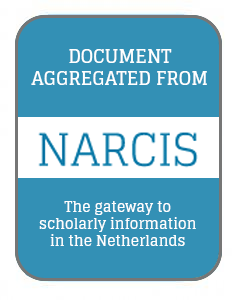Focal point
Location
National Academic Research and Collaborations Information System (NARCIS) is the main Dutch national portal for those looking for information about researchers and their work. NARCIS aggregates data from around 30 institutional repositories. Besides researchers, NARCIS is also used by students, journalists and people working in educational and government institutions as well as the business sector.
NARCIS provides access to scientific information, including (open access) publications from the repositories of all the Dutch universities, KNAW, NWO and a number of research institutes, datasets from some data archives as well as descriptions of research projects, researchers and research institutes.
This means that NARCIS cannot be used as an entry point to access complete overviews of publications of researchers (yet). However, there are more institutions that make all their scientific publications accessible via NARCIS. By doing so, it will become possible to create much more complete publication lists of researchers.
In 2004, the development of NARCIS started as a cooperation project of KNAW Research Information, NWO, VSNU and METIS, as part of the development of services within the DARE programme of SURFfoundation. This project resulted in the NARCIS portal, in which the DAREnet service was incorporated in January 2007. NARCIS has been part of DANS since 2011.
DANS - Data Archiving and Networked Services - is the Netherlands Institute for permanent access to digital research resources. DANS encourages researchers to make their digital research data and related outputs Findable, Accessible, Interoperable and Reusable.
Members:
Resources
Displaying 261 - 265 of 1863Detecting systemic change in a land use system by Bayesian data assimilation
A spatially explicit land use change model is typically based on the assumption that the relationship between land use change and its explanatory processes is stationary. This means that model structure and parameterization are usually kept constant over the model runtime, ignoring potential systemic changes in this relationship resulting from societal changes.
Flowers for food? : Scoping study on Dutch flower farms, land governance and local food security in Eastern Africa
The Netherlands is an important actor in the floriculture sector worldwide. Many Dutch flower companies have in recent years established businesses in the Global South as a result of favourable climatic conditions, available land and water resources, and the presence of cheap labour. With the aim to stimulate investments in developing countries (e.g., in the context of the Private Sector Investment programme) some companies were further incentivized by the Dutch government to start up their business through development-related subsidies or favourable loans.
Editorial: The governance of adaptation to climate change as a multi-level, multi-sector and multi-actor challenge: a European comparative perspective
There is increasing recognition of the need for society to adapt to the impacts of climate change, especially in the water sector. Adaptation to climatic impacts involves both infrastructural adjustments, such as reinforcing dykes or creating water storage capacity, and broader processes of societal change, such as adjusting land use planning, more efficient water use or agricultural transitions. The aim of this special issue is not to ‘assess’ the current state of play for adaptation strategies and policies in Europe.
GLOBIO-Aquatic, a global model of human impact on the biodiversity of inland aquatic ecosystems
Abstract Biodiversity in freshwater ecosystems – rivers, lakes and wetlands – is undergoing rapid global decline. Major drivers are land use change, eutrophication, hydrological disturbance, climate change, overexploitation and invasive species. We developed a global model for assessing the dominant human impacts on inland aquatic biodiversity. The system consists of a biodiversity model, named GLOBIO-Aquatic, that is embedded in the IMAGE model framework, i.e.
Perspectieven voor ecosysteemdiensten en natuur van een hoogwatergeul bij Varik Heesselt : een studie voor de NKN-casus Waterveiligheid Deltaprogramma
Doel van dit project is om aan de hand van twee pilots te bepalen wat de mogelijke economische en ecologische meerwaarde is van natuur-inclusieve oplossingen voor waterveiligheidsopgaven uit het Deltaprogramma en wat de meerwaarde van de TEEB-aanpak is in het planvormings- en besluitvormingsproces over deze maatregelen. Dit rapport handelt over de pilot “hoogwatergeul Varik-Heesselt”. De pilot was gericht op toepassing en evaluatie van de TEEB-methode. Het project is in nauw contact met de projectleider van de provincie Gelderland van het lopende planproces uitgevoerd.



